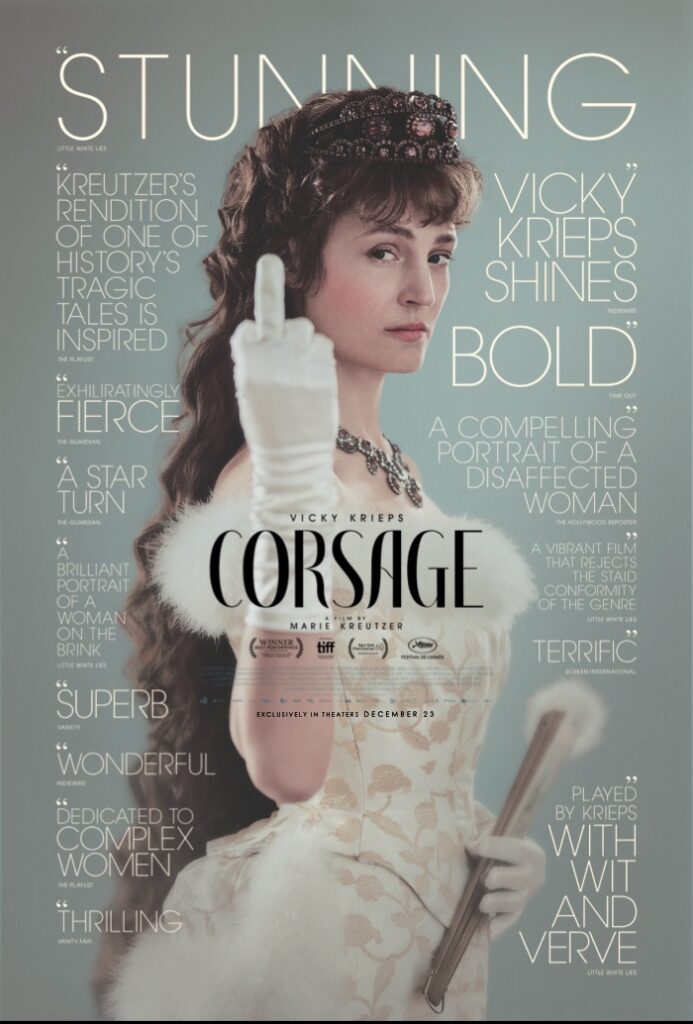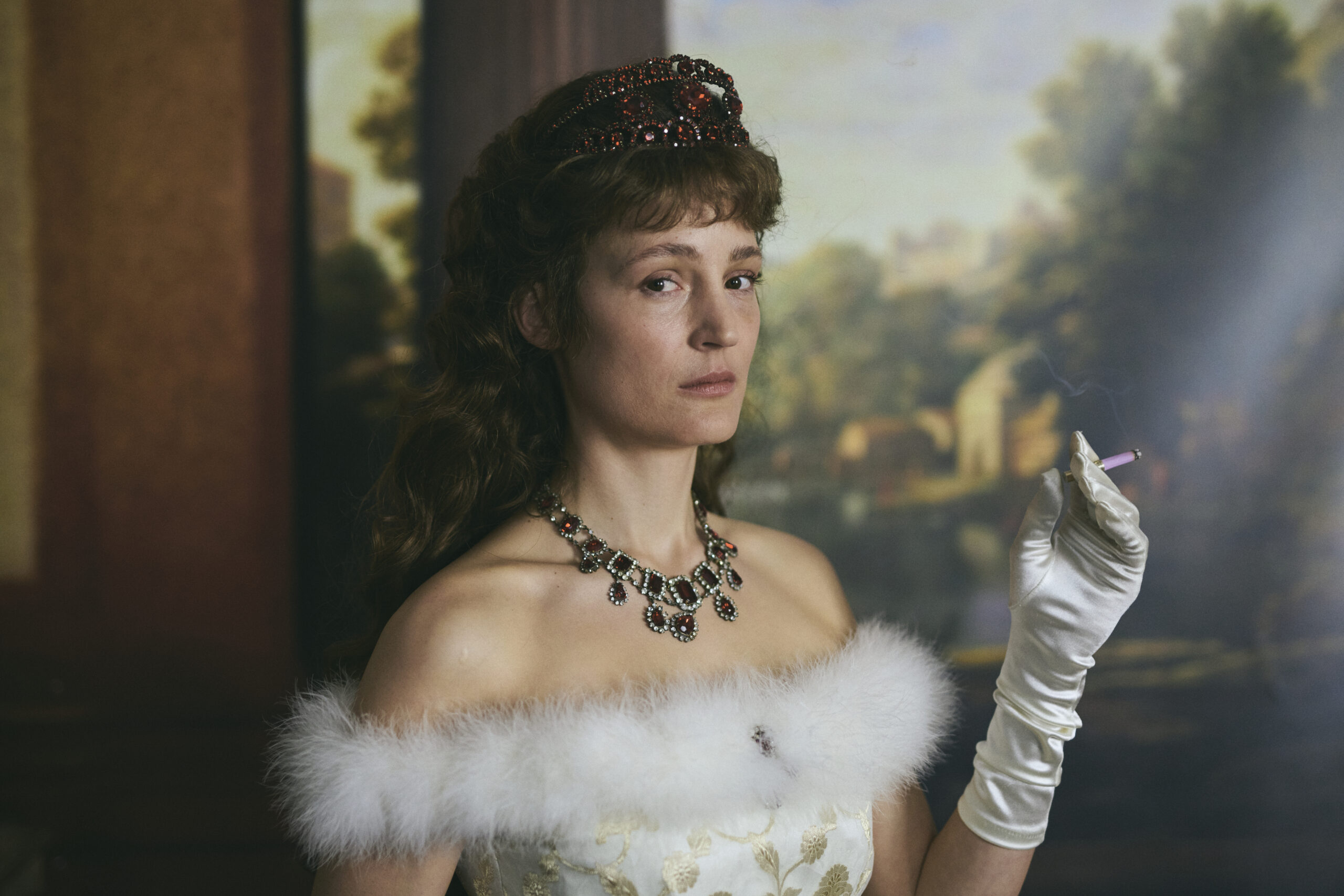For many, the first time that we engage with historical figures is through the medium of film and television. The truth of a monumental figure is skewed, adjusted, morphed, critiqued, or adored via the perspective of writers, directors, and the actors who utilise film as an attempt to possess some inkling of what made that figure important in history. For viewers, we will never truly know the absolute truth of the figure being portrayed, but if the intention of the creative team is pure, then the essence of who that person is should resonate with who they are.
Such is the case with Corsage, Marie Kreutzer’s stunning fictional account of Empress Elisabeth of Austria. This was my first encounter with the story of the Empress, and as each captivating minute unveiled yet another layer of how Kreutzer and lead actress Vicky Krieps perceived how the Empress lived her life under grand scrutiny and immense pressure to be frozen in time as a youthful beauty, I became enveloped in a wealth of empathy, tenderness, and compassion for this pivotal figure of Austrian history.

Corsage details one year in the life of the Empress, following on from her 40th birthday in 1877 when she is officially considered an ‘old woman’. From the opening scenes, we’re shown just how completely smothered and constrained Elisabeth is by the weight of expectation that comes with being an Empress, the cruelty of the patriarchy that demands she do nothing but sit and look proper, and the physical toll that this has on her body. Kreutzer, alongside the glorious costume work by Monika Buttinger, utilises the metaphor of the breath-stealing corsage as an item that restricts her personal freedom perfectly, with Elisabeth being cinched in place in stultifying garments that amplify her beauty, while restraining her autonomy. Elisabeth weaponises the regal costumes against those who laud them the most, fainting in the presence of men who comment openly on her figure. Later, in a private moment, the cheekiness of Elisabeth erupts as she teaches a confidant how to faint safely and convincingly. It’s these early moments that outlay just how Elisabeth uses any possible escape route to outwit and avoid the prying gaze of critical eyes.
Vicky Krieps disappears into the kaleidoscopic creation of a royal figure so perfectly and completely that the lines between actress and historical figure become blurred. Here is one of the most captivating and enchanting actresses working today, delivering yet another considered and grounded performance alongside a script and director who meet her at her level. The notion of an actress disappearing into the role they’re performing, allowing that figure to overwhelm their own identity entirely, is a hard thing to attain, yet Krieps manages to honour Elisabeth in a respectful way, as if she has become possessed by the echoes of the pains and the joys that Elisabeth lived with.
The layers of thematic resonance that Kreutzer employs here is impressive, as if her version of Elisabeth is conversing through time with other notable figures who have endured the same level of scrutiny and public tension as she did. Feeling the tension from her unfaithful husband Franz Joseph (Florian Teichtmeister, sporting a faux moustache that’ll leave many wrought with envy), she visits the Northamptonshire estate of the fifth Earl of Spencer (Raphael Nicholas), Diana, Princess of Wales ancestor. Here, Kreutzer plays with time, with Elisabeth encountering a film camera that gives her something that time itself can never give: the ability to stay frozen in youth and beauty as she currently is. There’s a levity to the Elisabeth in front of the camera that is absent elsewhere in her life. Here, she jumps, she smiles, she laughs, she plays. Free from judgement, she is free to be truly alive.
Being alive and full of joy is one thing but being understood and having another person acknowledge and appreciate her plight is another. Moments where Elisabeth visits hospitals where men lay in agony, recovering from limbs being removed or ailments that will claim their lives, and asylums where women deemed ‘insane’ or ‘mad’ are tethered to bedposts so they cannot move, create a powerful impact as they walk a tonal tightrope that is as metaphorically precarious as it is emotionally heartbreaking. Elisabeth sees herself in these fractured beings, these people who society has deemed don’t warrant the right to be whole. It’s a complicated line to draw, linking a royal figure with the outcasts of the world, but Kreutzer manages to pull the metaphor together in a soul-crushing moment where Elisabeth lays next to an ailing soldier, sharing a cigarette with the man. Here, finally, is a figure who understands how Elisabeth feels, and does not judge her for it.
Corsage becomes a transcendent experience in its final act, as Kreutzer rushes to a close that she feels is befitting of Elisabeth. It’s here that Mia Hansen-Løve’s masterpiece, Things to Come, sprung to mind as a thematic relative to Corsage. There, Isabelle Huppert’s middle-aged mother pulls back aspects of her life that are a burden until there is just the core essential that allow her to be built up once again. In Corsage,as the confines and expectations of royalty increase their burden, Elisabeth seeks for ways to escape the public. She employs a stand in figure, someone who yearns for the life of royalty yet has found themselves eluded by its grasp. She installs a permanent mistress for her husband. In yet another metaphor, she allows her beauty to be consumed by a black veil that hides her visage. Within Corsage, Kreutzer and Krieps Elisabeth is given agency over her own fate, transforming it from her tragic assassination in 1898 by needle file into an act of freedom where she is finally able to abandon those aspects that cause immense depression and anguish.
Corsage presents a timeless story of the impact of fame, fortune, and the search for the self within the confines of these societal structures. While no doubt having prior knowledge of Empress Elisabeth of Austria would be beneficial, Kreutzer and Krieps ensure that it is not essential to be able to appreciate her life, legacy, and the story they are telling. Corsage is delightful, devastating, cheeky, and charming, all surrounding yet another career milestone performance from the great Vicky Krieps. Do not miss this one.
Director: Marie Kreutzer
Cast: Vicky Krieps, Florian Teichmeister, Aaron Friesz
Writer: Marie Kreutzer



